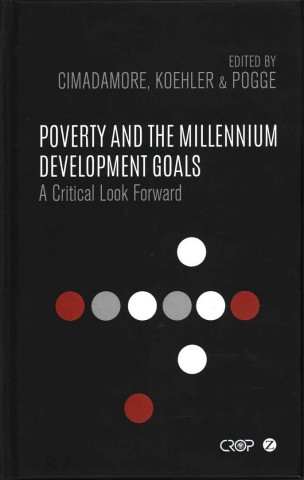The Millennium Development Goals (MDGs) were widely touted as having broad positive impact, and the Sustainable Development Goals (SDGs) continue the general, expanded, trajectory. With these high level, long-term agendas it is important to, on occasion, take ten steps back and reflect. Critical reflection may identify design challenges and structural flaws that can better inform, or entirely change, what is done in international development. Cimadamore, Koehler and Pogge (2016) offer such a space in their edited volume "Poverty and the Millennium Development Goals: A Critical Look Forward." This is not a typical critique of all that is 'development,' and the contributing authors include some engaged and widely respected individuals. As an edited volume, it is hard to review, but in particular I recommend Chapters 1, 2 and 6. Quotes from these chapters are included below, and identified as such.
The editors argue that a "critical assessment of the MGDs is necessary and we could have reached a moment in history conducive to producing the meaningful changes required to fulfil the commitment to eradicating extreme poverty and achieving human development and a better life for all. This volume intends to provide that kind of assessment, combined with a look ahead at the new development agenda" (p. 4, Chapter 1). However, the "trends suggest that, at the country level, income redistribution policies need to accompany poverty alleviation or eradication strategies. This has not been the case; neither in neoliberally oriented economies nor in the developmental states" (p. 12, Chapter 1). Furthermore, good intentions, and even good programs, only go so far. It "must be recognized that poverty, as well as its eradication and prevention, is a manifestly political issue… Policies that do not analyse the impact of power relations on the creation and re-creation of poverty can have only limited and superficial success" (p. 13, Chapter 1). Some of the explicit, political recommendations are repeated by others: "Promotion of participation, inclusion and voice of poor people is crucial to overcoming some of the political and structural determinants of poverty and its perpetuation" (p. 42, Chapter 2).
Chapter 2, a unique contribution from Sundaram, makes a compelling case for the flawed methodological system that determines "success" in the MDGs. Consider: "If one starts from the original poverty definition of $1/day (in 1985 dollars) used for drafting MDG1, and then corrects for US inflation in the 1985-2005 period, one gets an equivalent poverty line of $1.815/day (in 2005 dollars), or $55.18/month, which is clearly much higher than the $1.25/day for 2005 used by the World Bank. The number of poor would then be 2,698.42 million in 1990 and 2,146.68 million in 2010 – for a mere 20.5 percent reduction over twenty years, nowhere near the enough to halve the proportion, let alone the number, of poor in developing countries" (p. 32, Chapter 2).
There are also important reflections from the MDGs on the potential of reaching the SGDs: "Available evidence on poverty trends and our policy analyses suggest that continuing with the same set of policies and measures will not suffice to eradicate extreme poverty, or even to achieve a substantial reduction in acute and other forms of poverty by 2030" (p. 14, Chapter 1). Chapter 3 continues "People feel they have been bypassed by new economic opportunities. Access to markets and/or links to higher levels of society are hindered by their powerlessness and lack of resources for fair participation" (p. 48, Chapter 3). Chapter 6 attempts to re-focus the failures away from domestic decision making to "the treacherous features of the international system whose structure serves mainly the economic and political interests of powerful factions in donor countries" (p. 127) whose power is reinforced by voting weights in global governance structures.

